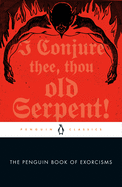
"How Did you feel when You say you were forced to Utter such words?" the justice of the peace Joseph Pitkin reports inquiring of a Boston woman two years after encountering her in the frothing, obscenity-spewing throes of what both believed to be a demonic possession. "I was Pressd as if my soul would be pressd out of my Body," Martha Roberson replied. So runs the account in Pitkin's diary of the 1740s, published for the first time in The Penguin Book of Exorcisms, an addition to the Penguin Classics collection that surveys the development of supernatural belief through spellbinding primary sources.
Like Penguin's volumes dedicated to witches, mermaids and the concept of Hell, editor Joseph P. Laycock's collection hopscotches across eras and cultures to track the genesis of an age-old idea that has persisted into contemporary culture. Demons, devils, dybbuks, jinn, zar and Chinese fox-spirits abound in accounts dating back to ancient times. Despite the international sweep, the emphasis is most often on the Christian tradition, with eyewitness reports on, among many others, the 17th-century possession of a convent of Ursuline nuns and the famous cases that inspired The Exorcist and Robert Eggers's film The Witch. One fascinating constant: a vigorous skepticism, dating back centuries, from writers eager to find rational explanations or even expose hoaxes. (A tip for those purporting to be possessed: don't mistake the Latin of The Aeneid for God's searing word.)
The editor's introductions are sharp and cogent. Laycock's selections honor this series' twin audiences: researchers and curious readers hungry for illumination--and a touch of terror. --Alan Scherstuhl, freelance writer and editor

